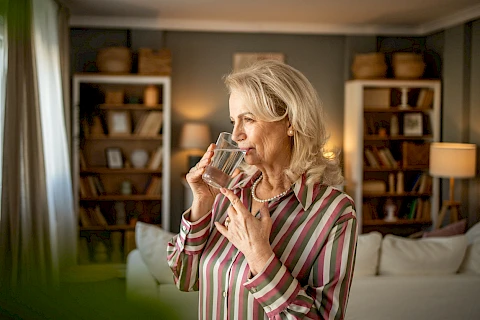
Hydration is good for everyone's health. Proper hydration helps with digestion, circulation, and temperature regulation. It's also good for maintaining bladder health. However, many seniors think drinking less water is better to avoid accidents when dealing with incontinence. This approach can lead to dehydration and other health complications and could even make incontinence worse. It's a tricky balancing act, but not an impossible one. We have tips that can help seniors balance hydration needs with incontinence concerns.
The Importance of Hydration for Senior Bladder Health
Proper hydration is vital for maintaining a healthy bladder. Drinking enough fluids helps flush out toxins and bacteria through urine, preventing infections. On the other hand, dehydration can lead to concentrated urine, which may irritate the bladder and worsen incontinence symptoms.
The risk of dehydration is higher for older adults because their bodies might not sense thirst as efficiently. Dehydration can cause confusion, dizziness, and urinary tract infections, which pose added risks for seniors. Recognize signs of dehydration, such as:
- Dark urine
- Dry mouth
- Headaches
- Reduced urine output
If you notice any of these symptoms, increase your fluid intake immediately. If the symptoms persist, consult a healthcare professional.
Strategies for Staying Hydrated
Establish a good hydration routine to stay hydrated while managing incontinence. One effective approach is to drink small amounts of water throughout the day. This helps keep fluid levels consistent without overwhelming the bladder at any one time. Seniors should try to avoid consuming large volumes of fluid all at once, which can lead to urgent bathroom needs.
Another important consideration is the timing of fluid intake. Reducing fluid consumption in the evening can minimize nighttime bathroom trips. Plan bathroom visits around your fluid intake schedule to better manage incontinence.
Not all drinks are created equal when it comes to hydration. Water is the best choice because it hydrates without added sugars or caffeine, which can irritate the bladder. Encouraging the inclusion of hydrating foods, such as fruits and vegetables, can also help meet hydration needs.
Practical Tips for Managing Incontinence
Use absorbent pads or underwear specifically designed for incontinence. These products can provide comfort and protection, reducing stress and anxiety about accidents.
Ensure the bathroom is easily accessible, with clear paths and no obstacles. This can be particularly helpful for seniors who have mobility issues. Establish a routine of regular bathroom visits, whether or not there is an immediate urge. This can help reduce the chances of accidents and make seniors feel more in control.
Open communication with healthcare providers is crucial when managing hydration and incontinence. Discuss any concerns and explore medical interventions or treatments that may help. Healthcare providers can offer advice tailored to individual needs, ensuring a balanced approach.
Are You Struggling With Hydration or Incontinence?
Balancing hydration and incontinence is vital for seniors' overall health and well-being. Staying hydrated supports good bladder function and prevents dehydration-related issues. Seniors and their caregivers should prioritize health and encourage open discussions with healthcare providers about concerns and challenges.
If you need more personalized support and care options, contact us. Senior Helpers Central Houston proudly serves seniors in Houston, South Houston, and Harris County with compassionate and professional assistance tailored to your unique needs, including personal care services.